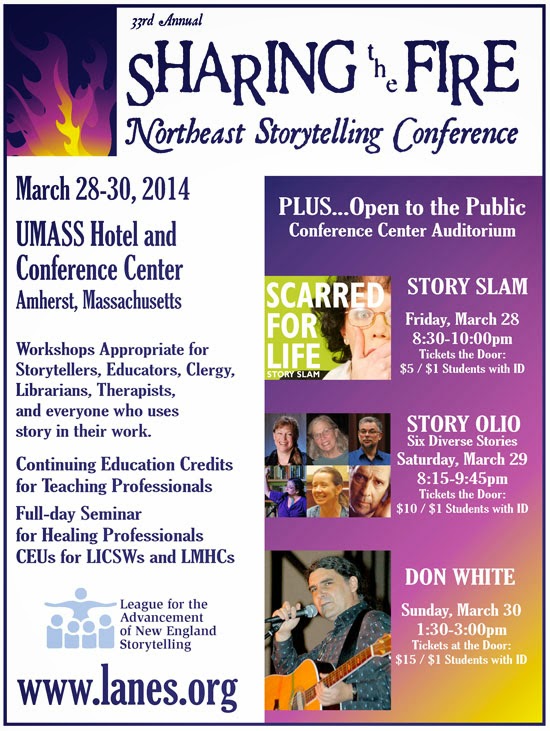I'm a big believer in the power of stories to engage, inform, and inspire. I use stories in my work as a branding and marketing specialist. Lawyers use stories to help jurors understand the guilt or innocence of their clients. Teachers tell stories to help children learn. Social workers and therapists use stories to help their clients heal. We all use stories to connect with family, friends, co-workers, or strangers we hope to know better. Humans brains are programmed to love to tell and listen to stories.
Today, story and narrative are increasingly regarded as valuable tools in a variety of business and organizational settings. Knowing how to tell a story can help you make a good impression, whether you’re selling an idea, making a presentation, or promoting yourself. So the challenge is not how does one become a storyteller -- if you've ever told a joke or responded to the question, "What did you do today?", you already are one -- no, the challenge is, how do you become a better storyteller.
When people ask me that question, I tell them go find some storytellers, and listen. I was lucky. I had a grandfather who loved to tell his very own made-up "papa bear" bedtime stories. As a result, I heard lots of stories as a child. Today, many communities have local storytelling groups. You can see if there are any in your area by looking on the National Storytelling Network website or the website of L.A.N.E.S., the League for the Advancement of New England Storytelling. A great way to get a big dose of storytelling, though, is to look for festivals or conferences, like L.A.N.E.S.
Sharing the Fire which will be held next week (March 28 -30) at the UMass Hotel and Conference Center in Amherst, MA.
Here’s a small preview of the weekend’s
attractions.
Friday night’s story slam, Scarred for Life (8:30 to 10:00) will be
extremely entertaining as storytellers compete to tell the best 5-minute
personal story on theme of “scarred for life” (emotionally or physically). If
you want to tell, put your name in the hat; otherwise, just sit back, listen,
and enjoy. After that, from 10:15 to 11:15, there’ll be a more informal slam
with stories on any topic. While college students get first priority, anyone is
welcome to tell a five-minute story.
Saturday morning, from 8:45 to 10:15, those interested in
understanding the many ways that people are using storytelling in today’s world
can hear keynote panelists Onawumi Jean Moss, Kiran Singh Sirah,
and Loren Niemi discuss the uses of new storytelling forms and of old forms in
new ways, often on the edges of our society.
Whether you’re making a presentation to clients,
co-workers, or to a community group, it can help to know how to get a laugh.
Lynn Cullen’s workshop, A Guy Walks into
a Bar: Making People Laugh (Saturday 10:30 to Noon) will show you how to
use the fundamentals of comedy to get your point across.
Stories
are an extremely effective way to bring about organizational change, build
marketing strategies, improve communication skills, and build leadership potential in educational, corporate,
nonprofits, start ups, advocacy organizations. In Putting Story Skills to Work for
Organizations (3:15 to 4:45) you hear
about techniques for eliciting, sharing and telling stories to help
organizations achieve their goals.
At Saturday night’s Olio (8:15 to 9:45), you’ll be
entertained by some of New England’s finest storytellers, including Diane Edgecomb, Katie Green, Doug Lipman, and Elisa Pearmain, and Bill Ratner.
Afterward, there’ll be another swap from 10:00 to 11:00.
Sunday morning, (10:15 to 11:45) Don White will show how
to use comedic techniques such as timing and body language to take command of a
room and grab an audience’s attention. Then
after lunch, (1:30 to 3:00) Don will give music and storytelling concert, where
you can watch him put those techniques to work.
So give it a try. Enjoy the slam on Friday. Or spend a few hours at workshops on Saturday. Or have a different kind of Saturday night out, listening to stories. Or do it all. I promise, you'll love it -- and you'll learn a lot that will inspire your own storytelling abilities.

